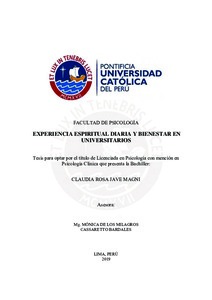| dc.contributor.advisor | Cassaretto Bardales, Mónica de los Milagros | es_ES |
| dc.contributor.author | Jave Magni, Claudia Rosa | es_ES |
| dc.date.accessioned | 2019-09-02T22:12:02Z | es_ES |
| dc.date.available | 2019-09-02T22:12:02Z | es_ES |
| dc.date.created | 2019 | es_ES |
| dc.date.issued | 2019-09-02 | es_ES |
| dc.identifier.uri | http://hdl.handle.net/20.500.12404/14895 | |
| dc.description.abstract | El objetivo de este presente estudio es relacionar la experiencia espiritual diaria y el
bienestar en estudiantes universitarios de una universidad privada de Lima. Participaron
en este estudio 101 alumnos entre los 18 y 25 años de la facultad de Ingeniería. Se utilizó
la escala de EED en la medición de la Experiencia espiritual diaria (Underwood, 2011);
y las escalas de la Afectividad Positiva (AP) y Afectividad Negativa (AN) del SPANE y el
Florecimiento (Flourishing) (Diener, 2010) en la medición del bienestar. Los resultados
mostraron relaciones significativas entre la experiencia espiritual diaria y los
componentes positivos del bienestar que fueron la afectividad positiva y el florecimiento.
Cabe señalar que las correlaciones encontradas fueron pequeñas y directas (r=.22,
p<0.05) con la AP y correlaciones medianas (r=.42, p<0.01) y directas con el
florecimiento. Finalmente, se encontraron diferencias significativas con respecto al sexo,
edad, salud percibida y religión para la EED; diferencias significativas según sexo, edad,
actividades que promueven la relajación y religión para la afectividad negativa y
diferencias significativas según salud percibida para la afectividad positiva y el
florecimiento respectivamente. A partir de los resultados se concluye, que la relación
entre la experiencia espiritual diaria y el bienestar podría deberse a que ambos se
vinculan con temas como sentido de vida, salud, felicidad, calidad de vida, bienestar
social, satisfacción vital y buscan desarrollar la salud óptima tanto del cuerpo, la mente
como del espíritu. | es_ES |
| dc.description.abstract | The purpose of the present study will be to compare the daily spiritual experience and
well-being in university students of a private university in Lima.101 students between 18
and 25 years old participated in the faculty of Engineering. The DSES scale was used in
the measurement of the Daily Spiritual Experience scale (Underwood, 2011); and the
scales of SPANE (Positive Affectivity (PA) and Negative Affectivity (NA) and Flourishing,
in the measurement of well-being (Diener, 2010). The results showed significant
relationships between the daily Spiritual Experience and the positive components of
wellbeing that were positive affectivity and flourishing. It should be noted that the
correlations found were small and direct (r=.22, p<0.05) with the PA and medium and
direct correlations (r=.42, p<0.01) with the flourishing. Finally, significant differences
were found regarding sex, age, perceived health and religion for DSES; significant
differences according to sex, age, activities that promote relaxation and religion for the
NA and significant differences according to perceived health for the PA and flourishing
respectively. Based on the results, it is concluded that the relationship between the daily
spiritual experience and well-being could be due to the fact that both are linked to issues
such as meaning of life, health, happiness, quality of life, social well-being, life
satisfaction and seek to develop the optimal health of the body, mind and spirit. | es_ES |
| dc.language.iso | spa | es_ES |
| dc.publisher | Pontificia Universidad Católica del Perú | es_ES |
| dc.rights | info:eu-repo/semantics/openAccess | es_ES |
| dc.rights.uri | http://creativecommons.org/licenses/by/2.5/pe/ | * |
| dc.subject | Bienestar | es_ES |
| dc.subject | Bienestar--Aspectos religiosos | es_ES |
| dc.subject | Espiritualidad | es_ES |
| dc.subject | Estudiantes universitarios--Investigaciones | es_ES |
| dc.title | Experiencia espiritual diaria y bienestar en universitarios | es_ES |
| dc.type | info:eu-repo/semantics/bachelorThesis | es_ES |
| thesis.degree.name | Licenciado en Psicología con mención en Psicología Clínica | es_ES |
| thesis.degree.level | Título Profesional | es_ES |
| thesis.degree.grantor | Pontificia Universidad Católica del Perú. Facultad de Psicología | es_ES |
| thesis.degree.discipline | Psicología con mención en Psicología Clínica | es_ES |
| renati.advisor.dni | 09491245 | |
| renati.advisor.orcid | https://orcid.org/0000-0002-4880-6092 | es_ES |
| renati.discipline | 313026 | es_ES |
| renati.level | https://purl.org/pe-repo/renati/level#tituloProfesional | es_ES |
| renati.type | http://purl.org/pe-repo/renati/type#tesis | es_ES |
| dc.publisher.country | PE | es_ES |
| dc.subject.ocde | https://purl.org/pe-repo/ocde/ford#5.01.00 | es_ES |






